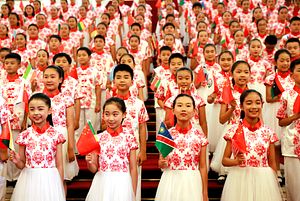Last week, the Beijing-based China-Africa Business Council (CABC) released a report detailing the size, pattern, and future trends of Chinese companies’ investment in Africa. The report was published in order to influence the outcomes of the upcoming 8th Forum on China Africa Cooperation (FOCAC) in Dakar, the date for which is still to be announced.
The CABC report reveals that despite the COVID-19 pandemic, China has become Africa’s fifth most important bilateral investor, and based on current trends China could be the top investor by 2024. That assessment and prediction are noteworthy. China has been Africa’s biggest bilateral trade partner for many years, but if China eclipses other countries to also become Africa’s top source of FDI, Africa-China economic ties will not only deepen, but African countries will also ascribe greater importance to their relationship with China.
The Chinese private sector push into Africa is not evenly distributed: 12 countries account for two-thirds of total investment on the continent. They include Egypt, Nigeria, South Africa, Angola, the Republic of Congo, Zambia, Ghana, Algeria, and the Democratic Republic of Congo (DRC). The biggest Chinese private companies operating in Africa include Huawei, Holley, Jiangsu Yongyuan, King Deer, China-Africa Cotton, StarTimes, Huajian, Transsion Holdings, and Sunda International. While around 25 percent of Chinese investments in 2019 went into the mining and extractive sector, the data suggests Chinese companies also focus on African countries as a sales destination that broadens their reach. For example, Transsion Holding – the company behind popular smartphone brands like Tecno, Infinix, and Itel – commands a 48.2 percent share of the African smartphone market. That is three times the share of Samsung (16 percent), its closest competitor.
However, closer reading of the report indicates two key challenges Chinese investors will need to grapple with.
First, with many African countries bent on economic diversification and boosting export of value-added products, the CABC acknowledges that strengthened cooperation in value-added industrial development is in the long-term interests of both China and African countries. With Africa’s ambition to become the next global manufacturing hub and China’s plans for dual circulation development, the push in the report is for the business community to look at African economies as more than just consumer markets or sources of raw materials. If China can achieve this, it will differentiate its investments from other external investors in Africa.
Second, the report suggests that investments should be made in line with the African Union’s Accelerated Industrial Development for Africa (AIDA) and African Mining Vision (AMV). This is interesting because there has been a recent uptick in reports of poor labor standards at Chinese extractive entities in African countries. In addition, the DRC is currently reviewing mining deals with its investors, including Chinese entities. The Congolese government’s priority appears to be ensuring the country gets the most benefit from its mining sector investments, as envisioned in the AMV.
Another key priority in the AMV is environmental management, and to that end the CABC report encourages Chinese firms to use renewable energy as the basis of investment, avoiding fossil-fuel investment. This is in line with recent data suggesting that no new coal projects with Chinese financing were announced in 2020, as well as new guidance from the Chinese government for firms to be more environmentally and socially responsible. However, some African countries like Nigeria may be concerned, because they continue to state that they plan to meet provide affordable and reliable energy for people, cities, and industry by tapping into fossil fuel sources. That said, the African Union’s energy plan is strongly focused on renewables.
While the CABC report can be seen as a sign of China reaffirming its commitment to Africa, by focusing on private sector driven financing, and suggesting this will be a key outcome of the forthcoming FOCAC in Senegal, two elephants in the room remain.
First, in the short term, Beijing’s strict COVID-19 controls on movement of people in and out of China mean it is incredibly difficult for Chinese investors keen on seeking out opportunities in Africa to undertake reconnaissance missions to sign on the dotted line. New guidelines just released that suggest Chinese nationals in some African countries, such as Nigeria, need to quarantine in advance of travel to China as well as spend up to 21 days in quarantine in China only exacerbate these challenges. Rigorous quarantine protocols could put a brake on the investment forecast trends, however positive in principle.
Second, it remains unclear to what degree the Chinese government is seeking to increase the role of private sector finance in Africa to compensate for a potential contraction in concessional loans. This “replacement strategy” has been used by some of Africa’s other development partners such as the G-7, and notably with regards to Build Back Better World. From an African perspective, estimates suggest that financing gaps in Africa – especially for infrastructure – are significant and it is unlikely they can be filled by the private sector, especially in countries seen as “risky.” Furthermore, evidence suggests that Public Private Partnerships (PPPs) can present significant risks when it comes to public utilities in poorer countries. African countries are also under pressure from multilaterals to reduce borrowing.
The promise of additional Chinese investment in Africa will no doubt be an interesting trend to continue to follow.

































